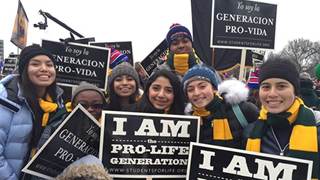Thousands gather in US capital to defend the life of the unborn child
- |

Thousands spoke up for the unborn child's right to life last week at the US March for Life in Washington DC.
At least 40,000 people attended the event, marching in support of the beauty and God-given value of every human life.
The event, which took place on January 22, marked the 43rd anniversary of the 1973 Roe v. Wade decision. This landmark ruling by the United States Supreme Court effectively legalised abortion across the country.
The theme for this year’s march was "Pro-life and pro-woman go hand-in-hand", challenging the argument that defending the life of the unborn child disregards the mother's well-being.
The third annual March for Life UK will take place on Saturday 14 May, at St Chad’s Cathedral in Birmingham.
This year, the UK march will centre around the idea of "Life from conception, no exception" - a statement that Christian Concern’s Chief Executive Andrea Williams has called "especially apt", in light of recent developments in pre-natal testing.
Abortion and pre-natal testing
A type of 'non-invasive prenatal testing', or NIPT, has been proposed as a new means to test unborn babies for genetic abnormalities such as Down's syndrome. The UK National Screening Committee (UK NSC) has recommended implementation of the new screening procedure on the NHS.
NIPT scans cell-free DNA (cfDNA) in the mother’s blood, which contains some of the baby’s cfDNA. CfDNA testing can detect the presence of the extra copy of chromosome 21 that causes Down’s syndrome. The cfDNA test is considered by scientists to be less invasive than amniocentesis, which involves using a needle to take a sample of the amniotic fluid surrounding the unborn baby.
Despite the 'benefits' of cfDNA testing, concerns have been raised that the technique may lead to increased abortions.
Sadly, statistics have indicated that 9 in 10 women whose unborn children are diagnosed with Down’s syndrome choose to abort.
The use of NIPT testing has also raised concerns, after a Department of Health review into 'gender-abortions' revealed that the test was sometimes used to determine the sex of the unborn child. Some have said that this could lead to an increase in 'gender-abortions'.
Aisling Hubert, a pro-life campaigner and Christian Legal Centre client, has been challenging the practice of 'gender-abortion' in the UK, after two doctors were caught on film offering 'gender-abortion' in 2012.
Christian Concern has responded to a consultation on cfDNA testing, highlighting the risks the testing poses to the unborn child.
Read more about NIPT and the campaign to speak against the tragedy of Down’s syndrome abortions.
Andrea Williams comments:
"Now more than ever we need to be affirming the truth of human life - that it is given by God, that it begins at conception, and that it has design, purpose and value.
"As believers in a life-giving Saviour, we must endeavour to proclaim this beautiful truth, speaking for those who are unable to speak for themselves."
Find out more about the UK March for Life event and watch a video to find out why others are participating.
Related News:
Don't Screen Us Out initiative to protect babies with Down's
Challenging society's perception of Down's syndrome
High Court challenge to DPP over failure to prosecute 'gender-abortion' doctors
Related Coverage:
35 of the Most Interesting Signs at the March for Life (Daily Signal)
